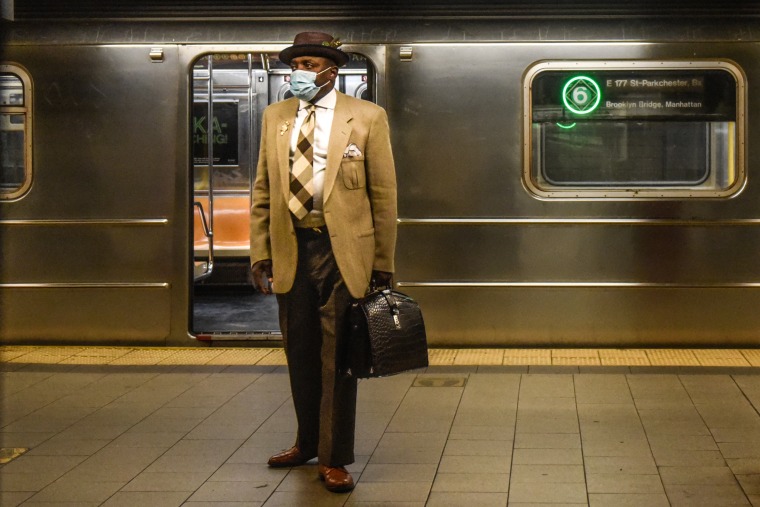Signs in the U.S. continue to point to a rise in Covid activity as fall approaches.
Hospitalizations are rising. Deaths have ticked up. Wastewater samples are picking up the virus, as are labs across the country.
“Every single one of those things is showing us that we have increased rates of Covid transmission in our communities,” said Jodie Guest, a professor of epidemiology at Emory University’s Rollins School of Public Health in Atlanta.
While individual cases have become more difficult to track as states are no longer required to report numbers to the Centers for Disease Control and Prevention and at-home test use has increased, experts have turned to other tools to track the virus.
Hospitalizations, for example, are “a very good indicator of severity of Covid disease,” Guest said.
The number of hospitalized Covid patients has continued to rise after hitting an all-time low in late June. The week ending Aug. 26, the most recent date for which data is available, there were just over 17,400 people hospitalized with Covid, up nearly 16% from the previous week, according to the CDC.
The increase comes even as hospital testing protocols have changed. At the height of the pandemic, every patient admitted to the hospital was tested for Covid, whether they had symptoms or not.
“We’re now only testing people who are symptomatic,” said Guest, who added that this makes it difficult to directly compare hospitalization numbers to what was seen previously in the pandemic. Current numbers may be missing asymptomatic cases and therefore be lower than earlier ones.
Dr. Peter Chin-Hong, a professor of medicine at the University of California, San Francisco, said that at his hospital system, 21 patients are hospitalized with Covid. Earlier in the summer, it ranged from 10 to 15 patients, he said, so while the numbers have gone up, it’s nothing like what the hospital saw last winter, when more than 100 patients were hospitalized with Covid.
Emergency room visits with a Covid diagnosis in the U.S. have been on the rise since early July. The week ending Aug. 19 saw 2.3% of ER visits with a Covid diagnosis, up from 0.5% the week ending July 1, according to the CDC.

Wastewater samples are also showing an increase in Covid.
“The wastewater is giving us a pretty clear picture that there has been, you know, quite an uptick in cases in these communities that we’re monitoring recently,” said Marlene Wolfe, an assistant professor of environmental health at Emory University and program director for WastewaterSCAN, which monitors 171 wastewater treatment sites in 34 states.
“We are in a period of higher levels of SARS-CoV-2 in wastewater right now, and that’s associated with an increase in the number of cases in the community,” Wolfe said, referring to the virus that causes Covid.
Deaths appear to be up slightly, after a summer in which weekly totals hovered under 600 — and occasionally dipped below 500 — for much of June and July. The week ending Aug. 19 saw 636 deaths, according to the CDC.
Other signs of increased Covid activity are easy for the general public to spot.
“When you know multiple people who are currently experiencing symptoms of Covid or tested positive of Covid, that’s another great marker to recognize how much of it there is in your community,” Guest said. “We also see Covid tests being absent on their shelves in Walgreens and CVS and other places as well, because people have more transmission right now.”
Is the BA.2.86 variant to blame?
Experts say no. While there are a slew of variants in circulation in the U.S., BA.2.86 remains very rare. As of Aug. 30, the CDC said that the variant had been detected in four states: in Michigan, New York, Ohio and Virginia.
Instead, the current increases in cases and hospitalizations are likely due to the XBB subvariants, the CDC says. Those include subvariants called EG.5 (which accounted for 21.5% of new cases for the week ending Sept. 2) and FL.1.5.1 (14.5% of new cases).
What’s more, the BA.2.86 variant — dubbed “Pirola” by some on social media — may not be as bad as scientists initially feared.
“Just looking at the virus, structurally, it looks scary with all the mutations compared to XBB.1.5, which the vaccine was based on,” Chin-Hong said. XBB.1.5 is the subvariant that the new boosters, coming out later this month, were designed to target.
But new research shows that people who had been infected with an XBB subvariant in the past six months performed well against BA.2.86, Chin-Hong said. That suggests that the new boosters would be able to fend off this variant, even if it does become dominant, he added.
How can people protect themselves and others?
The advice to protect against Covid remains the same, including masking, staying home when sick, getting tested for Covid if exposed or symptomatic, and staying up to date on vaccines.
“If you’re in a crowded situation, recognizing the odds are that someone in that room probably does have Covid-19 at this point in time and so masking is a great way to protect yourself and to protect others that you’re going to be around later,” Guest said.
Chin-Hong advised carrying around a mask and bring it out for risky situations, like while using public transit or at the airport.
He also suggested that people have a plan to get therapies like Paxlovid or remesdivir if they test positive, particularly older or immune-comprosmised individuals who are at higher risk for complications.
The CDC also notes that improving ventilation indoors can help protect against infection. That can involve opening windows, turning on fans and using air filters to clean the air.
The Food and Drug Administration and the CDC are expected to sign off on new Covid boosters in the next few weeks, which target one of the XBB variants.
Guest said people should wait for the new boosters to become available. “But we want people to get that booster when it comes out,” she said.
Follow NBC HEALTH on Twitter & Facebook.







